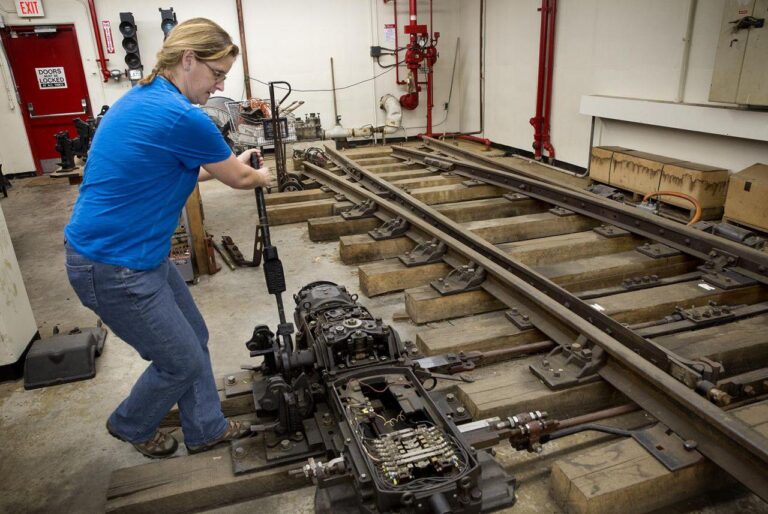The Massachusetts Bay Transportation Authority (MBTA) is confronting notable challenges as its aging signal system continues to strain under the demands of a busy commuter network. With decades-old infrastructure at the heart of its rail operations, the agency faces mounting pressure to modernize critical signaling components to ensure safety, reliability, and efficiency. As delays and technical issues persist, the MBTA’s struggle highlights the urgent need for substantial investment and overhaul in its rail signaling technology.
Table of Contents
- MBTA Signal System Struggles Under the Weight of Decades-Old Technology
- Safety Risks and Delays Mount Amid Signal Failures Across the Network
- Experts Call for Comprehensive Modernization and Increased Funding
- Innovative Solutions Proposed to Enhance Reliability and Passenger Experience
- In Retrospect
MBTA Signal System Struggles Under the Weight of Decades-Old Technology
The MBTA’s signal infrastructure is buckling under the pressure of aging components originally installed decades ago. These outdated systems, many of which rely on legacy relay-based technology, struggle to keep pace with modern operational demands. This has resulted in frequent service disruptions, delayed trains, and compromised safety protocols. Without comprehensive upgrades, the MBTA risks a continuing cycle of inefficiency that erodes rider confidence and strains maintenance budgets.
Key challenges faced include:
- Obsolete hardware prone to failure and arduous to source for repairs
- Limited integration capabilities with newer digital control systems
- Increased vulnerability to signal malfunctions during peak service hours
- Escalating maintenance costs exacerbated by a shortage of specialized technicians
Efforts to modernize have been slow, often overshadowed by competing priorities such as rolling stock overhauls and other infrastructure projects. Without accelerated investment in state-of-the-art signal technology, the MBTA may continue to experience a cascade of operational headaches that ripple through Greater Boston’s transit network.
Safety Risks and Delays Mount Amid Signal Failures Across the Network
Passengers and staff alike have been grappling with frequent signal malfunctions that jeopardize both safety and schedule reliability across the MBTA network. These failures have led to cascading delays, forcing emergency protocol activations and causing widespread commuter frustration. The aging infrastructure, characterized by obsolete relay-based signal systems, struggles under growing operational demands, increasing the risk of miscommunication and train conflicts. Reports indicate that signal failures have contributed to near-miss incidents and escalated safety concerns among transit operators, sparking calls for urgent modernization.
The ripple effects of disrupted signaling extend beyond immediate timetable setbacks:
- Increased headways and bottlenecks, reducing network capacity during peak hours.
- Heightened reliance on manual overrides, raising the potential for human error.
- Compromised passenger confidence due to unpredictable service interruptions.
With safety protocols stretched thin and delays mounting, transit advocates stress that proactive investment in advanced, automated signal technology is essential to restoring reliability and protecting riders on one of the nation’s busiest urban rail systems.
Experts Call for Comprehensive Modernization and Increased Funding
Transportation and infrastructure experts are urging the MBTA to undertake a sweeping overhaul of its antiquated signaling technology, highlighting the urgent need for substantial investment. They stress that the current system, plagued by frequent breakdowns and maintenance challenges, not only compromises operational efficiency but also poses significant safety risks. Without a coordinated modernization effort, the region’s transit network faces escalating delays and diminished service reliability that could hinder economic growth and commuter satisfaction.
Key recommendations from industry specialists include:
- Deploying state-of-the-art, digital signaling and communications technologies
- Securing dedicated funding streams to support both immediate repairs and long-term upgrades
- Integrating predictive maintenance systems to proactively address failures
- Increasing collaboration between federal, state, and local agencies to streamline project implementation
Without decisive action and increased capital commitments, Boston’s transit system faces growing operational vulnerabilities as its aging infrastructure continues to deteriorate. Experts emphasize that this is a critical juncture to reverse declining conditions and future-proof service for millions of daily riders.
Innovative Solutions Proposed to Enhance Reliability and Passenger Experience
To tackle persistent issues stemming from the MBTA’s aging signal infrastructure, transit authorities have unveiled a slate of cutting-edge technologies aimed at boosting system reliability and elevating passenger satisfaction. Key among these initiatives is the deployment of advanced predictive maintenance platforms utilizing AI-driven diagnostics, which monitor signal health in real-time to preempt failures before they disrupt service. Additionally, integration with next-generation communication networks promises to streamline train coordination, ensuring smoother operations and reducing delays during peak hours.
Passengers can also expect significant upgrades to their travel experience, underscored by enhanced digital data systems delivering real-time updates and more accurate arrival predictions. Proposed innovations include:
- Smart signal retrofits that dynamically adjust to traffic conditions
- Mobile app integrations for personalized transit alerts
- Upgraded onboard communication systems improving safety announcements and emergency responsiveness
- Energy-efficient signal components reducing environmental impact and operational costs
These efforts collectively signify a bold step forward in modernizing Boston’s rail network despite financial and logistical constraints, aiming to restore confidence among daily commuters and stakeholders alike.
In Retrospect
As the MBTA confronts the challenges posed by an aging signal system, the coming years will be critical in determining the future reliability and safety of its transit network. With growing ridership and increasing demands on infrastructure, investing in modernized technology is essential to prevent disruptions and enhance commuter experience. Stakeholders now face the urgent task of mobilizing resources and expertise to upgrade these vital systems before delays become untenable. The clock is ticking, and the MBTA’s ability to navigate this complex overhaul will shape the trajectory of public transit in the region for decades to come.

